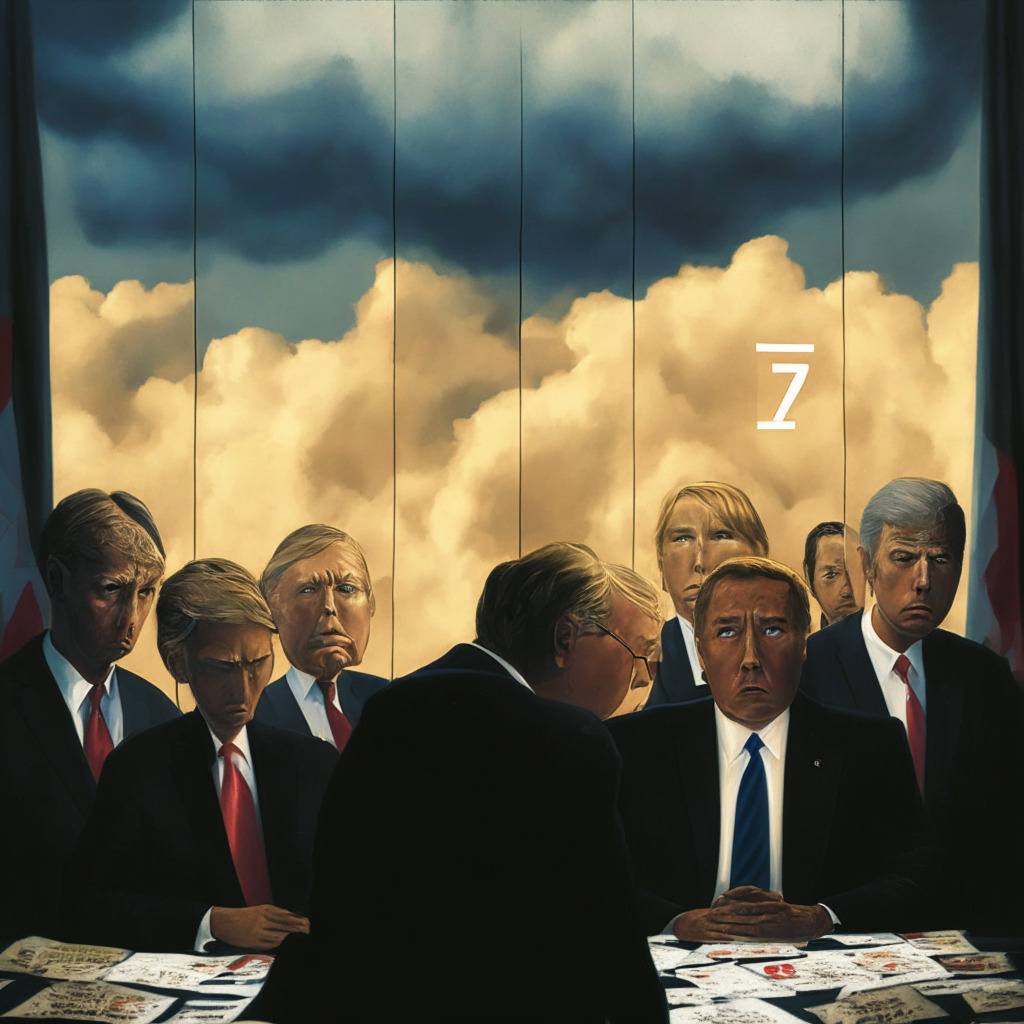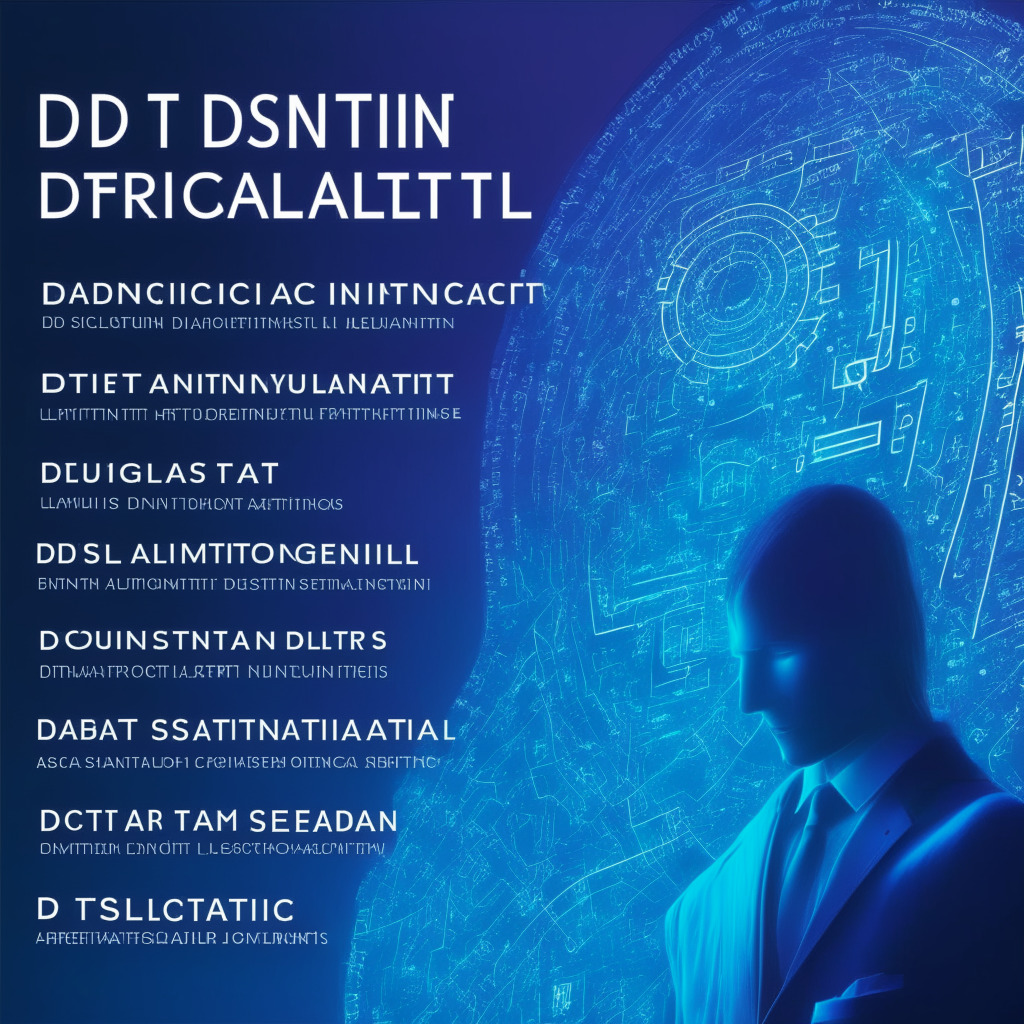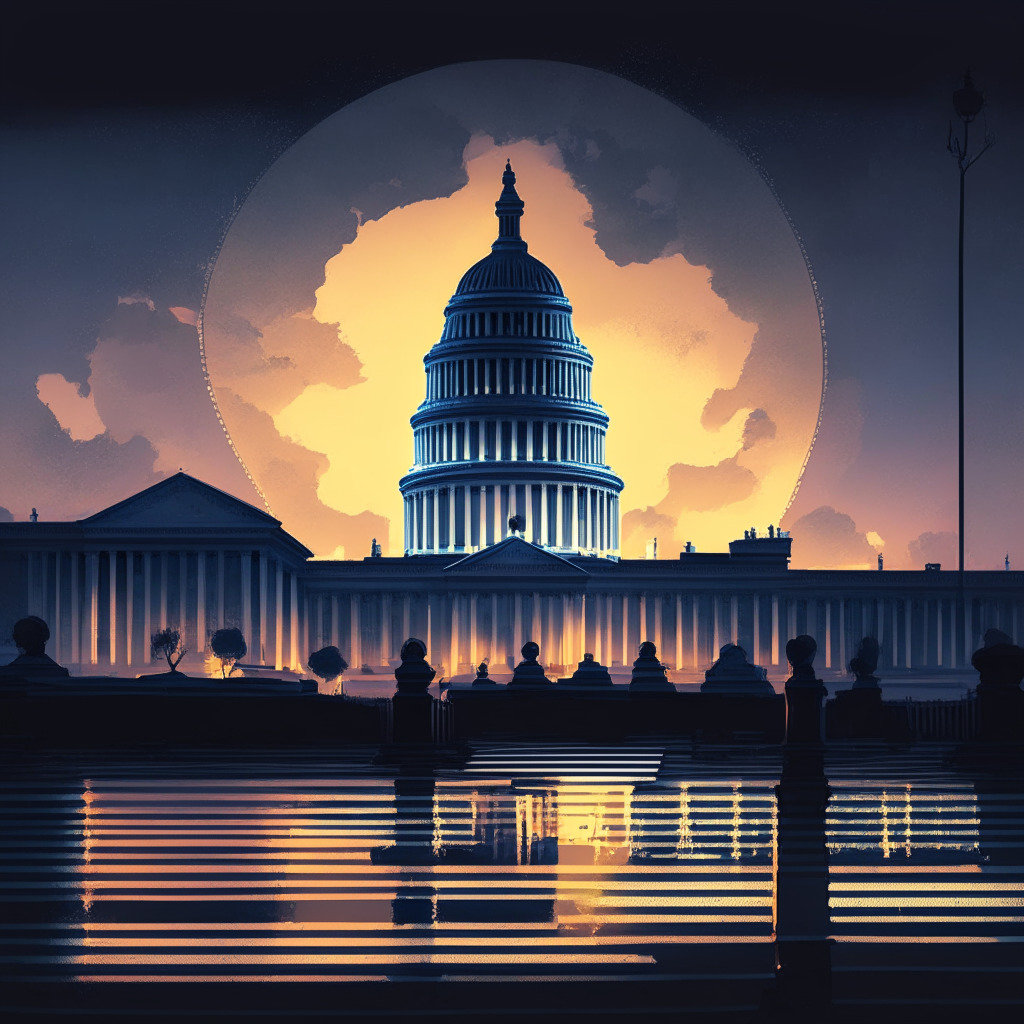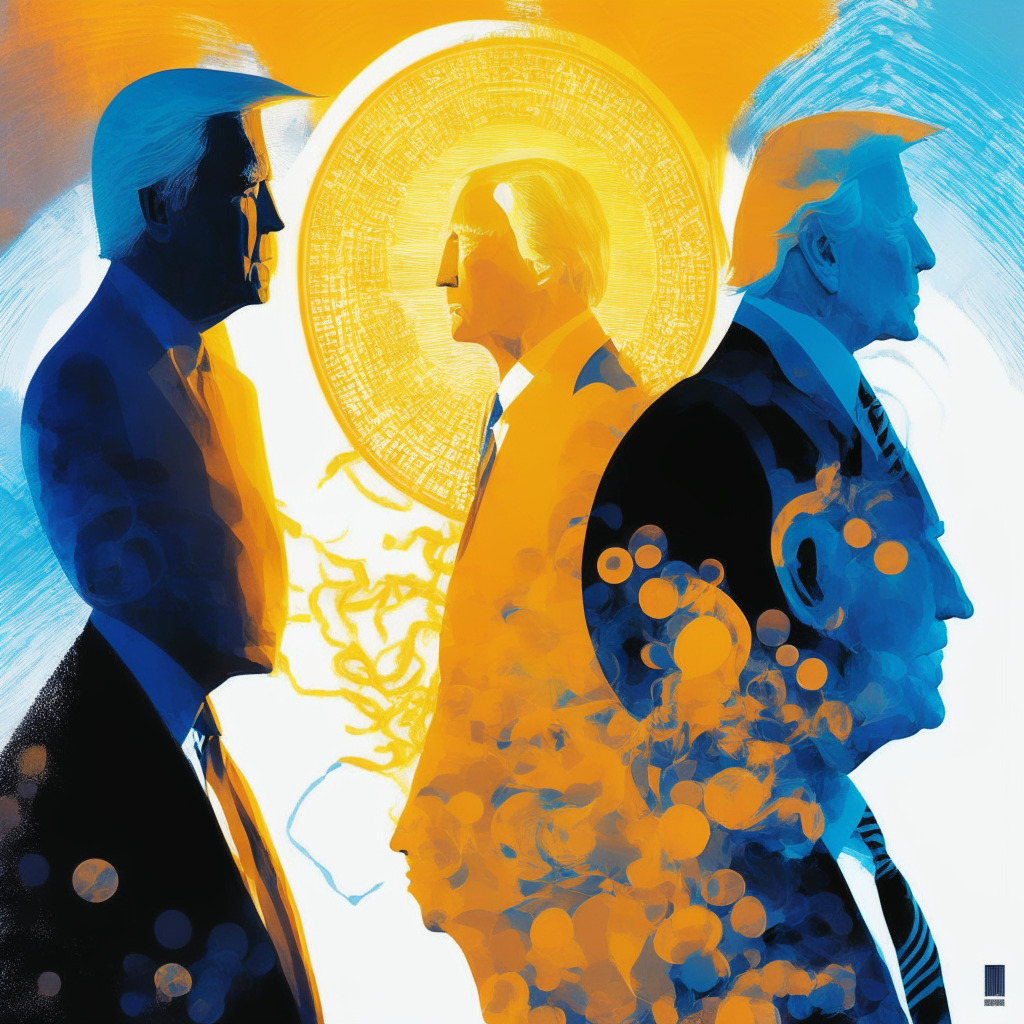Analyst Marcel Pechman discusses Bitcoin’s stagnation around $27,000, attributing it to macroeconomic factors. He explores the possibility of a breakout towards $29,000 but highlights less probable bullish gains due to current futures premium and options risk metrics.
Search Results for: Joe Biden
Navigating the Regulatory Maze: Driving Stablecoin Legislation Under Biden’s Administration
Chair Patrick McHenry of the US House of Representatives’ Financial Services Committee affirms his commitment to regulate stablecoins. He steers two digital asset bills targeted at stablecoin regulation, and bringing clarity to the role between the CFTC and SEC. McHenry highlights potential bipartisan support and the global influence of dollar-denominated stablecoins, emphasizing complex power dynamics beyond the digital asset scope.
Biden’s Crypto Tax Regulations: A Threat to Innovation or a Step Towards Transparency?
“Recently, the crypto market experienced a significant ripple due to new proposed crypto tax reporting regulations by President Joe Biden. Critics argue these regulations could stifle innovation and make crypto firms reluctant to operate within the United States.”
Biden’s AI Summit: Balancing Innovation, Regulation, and Blockchain Implications
President Joe Biden is set to meet with AI experts to discuss the future of artificial intelligence and the need for legislation and guidelines. This comes at a time when the U.S. government has yet to establish a comprehensive strategy for AI development and cryptocurrency regulation, while Europe, China, and the United Kingdom have already made progress in these areas. The meeting aims to address concerns on policy, regulation, and balancing innovation with safety and risk mitigation.
Crypto Divide in 2024 US Presidential Election: DeSantis vs Biden on Bitcoin & CBDCs
Digital assets are becoming a significant topic in the 2024 U.S. presidential election, with Florida Gov. Ron DeSantis championing a pro-crypto stance while critics accuse the Biden administration of hindering crypto growth and advocating for CBDCs. The debate’s potential influence on the election is still uncertain.
DeSantis’ Presidential Bid Stumbles: Tech Glitches, Biden’s Taunts, and the Future of Politics
Florida Gov. Ron DeSantis’ announcement of his 2024 Presidential bid faced technical difficulties during a live Twitter Spaces conversation with Elon Musk, impacting potential promotion of his campaign. The incident raises concerns about the future of technology in politics and the importance of choosing reliable communication platforms for political purposes.
Debt Ceiling Crisis Looms: US Economy on the Edge as Biden and McCarthy Struggle to Agree
As the June 1 deadline approaches, the impasse between President Biden and House Speaker McCarthy on raising the US government’s debt ceiling could lead to an unprecedented debt default, impacting the US economy and global markets. With the Treasury’s cash reserves dwindling, both parties need to find a resolution to avoid disastrous consequences.
Biden vs Republicans: Crypto Taxation Clash at G7 Conference and Its Impact on the Industry
At the recent G7 Forum conference, US President Joe Biden criticized wealthy tax cheats and crypto traders, expressing his opposition to pro-crypto deals in ongoing budget negotiations. This clash on cryptocurrency regulation highlights discrepancies that could significantly impact the industry’s future landscape, with both sides seeking to reach a resolution.
Debt Ceiling Talks and Crypto: Biden and McCarthy’s Clash to Impact Market Future
As the U.S. debt ceiling deadline approaches, President Joe Biden and House Republican Speaker Kevin McCarthy’s varying viewpoints on protecting wealthy tax evaders and cryptocurrency traders may significantly impact the future of cryptocurrencies. The outcome of their discussion could reshape the crypto landscape, affecting the technology, markets, and safety of digital assets.
G7 Fallout: Biden Slams Crypto Traders, Tax Cheats, and Republican Backers Amid Budget Talks
U.S. President Joe Biden criticized wealthy tax cheats and crypto traders at the G7 forum in Japan, while discussing budget negotiations and the risk of debt default. His administration aims to modernize rules for digital assets and ensure a fair financial ecosystem without compromising innovation.
Biden’s Stance on Crypto Taxes: Unmasking the Divide in the US Debt Crisis Debate
During the G7 talks, President Joe Biden declared the proposed budget terms as “unacceptable,” arguing that protecting tax-loss harvesting strategies for crypto traders risks food assistance for Americans. This controversy highlights the growing divide between the White House and Republican leaders, with ongoing negotiations surrounding US debt crisis and tax-related loopholes putting the country’s financial future in debate.
G7 Summit: Biden’s Crypto Opposition & Debt Ceiling Debate – Tax Implications & Future Regulation
At the G7 summit, President Joe Biden opposed a debt ceiling agreement allegedly favoring crypto traders through tax-loss harvesting, calling the terms “unacceptable.” The controversy highlights the need for a comprehensive regulatory framework addressing traditional finance and emerging technologies like blockchain and digital assets.
Crypto Market News: Srinivasan’s BTC Predictions & Biden’s Stance on Debt Deals
In recent crypto news, Balaji Srinivasan’s Bitcoin price prediction and President Biden’s stance on crypto-related debt deals highlight the changing landscape of cryptocurrency and the importance of staying informed. As the 2024 election approaches, discussions surrounding crypto regulation and Web 3.0 could intensify among US lawmakers.
G7 Summit, Biden’s Disapproval & Crypto: Debating Tax & Regulation in Uncertain Times
During the G7 summit, President Biden criticized a debt deal for protecting wealthy tax cheats and crypto traders, while US Treasury Secretary Janet Yellen warned of catastrophic consequences if an agreement isn’t reached. This highlights ongoing tensions between supporting the expanding crypto market and ensuring fair responsibility, as the US debt ceiling deadline approaches and the future of crypto regulation remains uncertain.
Biden-McCarthy Debt Ceiling Talks Impact Crypto Market: Uncertainty and Its Consequences
A delay in pivotal discussions between U.S. President Joe Biden and House of Representatives Republicans has left the financial market, including the crypto market, feeling uncertain. The 24-hour crypto trading volume decreased by 23% as participants await clarity on raising the federal $31.4 trillion debt ceiling.
Biden’s Proposed 30% Bitcoin Mining Tax: Impact on National Security and Clean Energy
Sen. Cynthia Lummis addressed concerns over President Biden’s proposed 30% excise tax on Bitcoin miners, stating it could negatively impact both Bitcoin mining and national security. Although lawmakers remain skeptical due to criminal activity associations, Lummis emphasizes the importance of promoting Bitcoin mining in the US for energy security and potential environmental advantages.
Biden’s Federal Reserve Nominations: How They Could Shape the US Crypto Future and CBDC Debate
President Joe Biden nominates economist Philip Jefferson and former chief economist Adriana Kugler for critical roles in the Federal Reserve, impacting the U.S. government’s approach to cryptocurrencies, blockchain technology, and the potential introduction of a central bank digital currency (CBDC).
Biden Targets Crypto Tax Loopholes: Fact or Fiction? Understanding the Debate and Its Impact
President Joe Biden recently called for an end to alleged tax loopholes assisting wealthy crypto investors, without providing specifics regarding such loopholes or reforms. The crypto community responded skeptically, highlighting the smaller size of the crypto market and questioning the existence of these loopholes. Speculations suggest possible connection to the IRS wash sale rule.
Biden’s Crypto Tax Proposals: Balancing Innovation vs. Financial Fairness Debate
As President Biden proposes tax code updates for crypto assets in his fiscal year 2024 budget, critics argue that the U.S. should support the growing technological and financial revolution of cryptocurrency. Meanwhile, concerns over unclear regulatory guidance and a proposed 30% excise tax on crypto miners’ energy consumption intensify the debate on cryptocurrency regulation and innovation support.
Biden vs MAGA: Crypto Tax Loopholes, Energy Concerns, and the Future of Blockchain
President Biden proposed the Digital Asset Mining Excise (DAME) tax, targeting crypto mining energy consumption and the tax treatment of digital assets alongside critiquing “wealthy crypto investors.” The ongoing debate surrounding digital assets will continue shaping cryptocurrency market regulations and future.
RFK Jr. Challenges Biden’s Crypto Stance: Privacy, Taxation, and CBDC Concerns Unveiled
Robert F. Kennedy Jr. criticizes President Biden’s 30% tax on crypto mining and expresses concerns over government control on bank accounts and payment platforms. He opposes central bank digital currencies, arguing they could be used to subdue dissent by cutting off access to funds.
Biden’s Blockchain Focus: Digital Identity, DLT Advancements, and Balancing Privacy
The US government has emphasized the development of critical and emerging technologies, including digital identity infrastructure and distributed ledger technologies (DLT). As blockchain gains significance in the economic landscape, challenges arise in balancing innovation and privacy, while aiming to bolster US competitiveness and maintain a secure digital environment.
Economic Mega-Crisis: Kennedy Challenges Biden, Debates Cryptocurrency & Banking Collapse
Robert F. Kennedy Jr. warns of an impending economic “mega-crisis,” calling for urgent attention to rebuild the economy as job openings plummet and inflation hits the middle and working class. Kennedy criticizes President Biden’s proposed Digital Asset Mining Energy (DAME) excise tax, asserting the importance of cryptocurrencies in driving innovation and maintaining financial freedom.
Biden’s Confidence in Banking Amid Defaults: Fact or Fiction? Pros, Cons, and Conflicts
Amid the recent collapse of the second, third, and fourth largest banks in American history, […]
Crypto Countdown: Congress Aims for Legislative Leap in 2 Months or Less – Buckle Up, Biden!
Crypto Countdown: U.S. Congress Aims for Legislative Leap in 2 Months or Less – Buckle […]
2024 U.S. Presidency & Crypto: Favouring Central Bank Digital Currencies or Upholding Bitcoin?
“According to Grayscale, presidential candidates Joe Biden and Donald Trump might support the development of central bank digital currency (CBDC), despite their unclear stance on Bitcoin. Other candidates have expressed both support for cryptocurrencies and opposition to CBDCs. Amidst this, regulatory uncertainty tests the resilience of crypto firms and generates various views about the future of cryptocurrencies.”
Bitcoin ETFs Surge 5%: Institutional Buying and Debt Ceiling Deal Fuel Crypto Rally
Multiple Bitcoin ETFs, including ProShares Bitcoin Strategy ETF (BITO) and Valkyrie Bitcoin Strategy ETF (BTF), witnessed a 5% jump in pre-market hours on Tuesday, indicating institutional buying and anticipation of a BTC price rally. The recent debt ceiling agreement between President Joe Biden and Republicans eliminated a 30% tax on Bitcoin mining, positively affecting markets.
US Debt Ceiling Agreement Fuels Bitcoin’s Rally: Will the Bullish Trend Continue or Correct?
Bitcoin’s value sees an uptick amid US debt ceiling discussions, as a preliminary agreement is reached between President Joe Biden and Republican leader Kevin McCarthy. The debt ceiling agreement could impact the Federal Reserve’s money-printing activities, potentially benefiting Bitcoin due to its inverse trading relationship with the USD. However, a significant barrier at the $28,300 level may affect Bitcoin’s upward trajectory.
Debt Ceiling Deal Blocks Crypto Mining Tax: Boon or Bane for the Industry and Environment?
President Joe Biden and House Representative Kevin McCarthy reached a tentative debt ceiling deal that, if passed, would block the proposed 30% tax on crypto miner’s electricity bills. Critics argue the blocked tax denies encouragement for sustainable energy practices in the crypto mining industry, while proponents view it as a victory for maintaining competitiveness.
Debt Ceiling Crisis Averted: Can Divided Congress Unite for Economic Stability?
US President Joe Biden and House Representative Kevin McCarthy have reached a tentative agreement to raise the $3.4 trillion debt ceiling, potentially preventing a catastrophic default that could devastate the economy. However, the deal still requires approval from a divided Congress before June 5.
Debt Ceiling Deal Boosts Bitcoin: Navigating Politics and Crypto Market Opportunities
The crypto market surged as Bitcoin crossed $27,000 following an in-principle debt ceiling deal agreement between President Joe Biden and Kevin McCarthy. The deal averts potential economic recession, brings relief and security, and could lead to a Bitcoin rally, highlighting the importance of understanding the implications of economic policies on the crypto market and staying informed about political events that shape the industry’s trajectory.
Debt Ceiling Deal Looms: Analyzing Its Impact on Cryptocurrency and Traditional Finance Markets
US President Joe Biden and Republican leader Kevin McCarthy are finalizing a deal to raise the $31.4 trillion debt ceiling, while core PCE inflation hits 4.7%, impacting interest rates and causing Bitcoin price drop. The debt ceiling deal and inflation data reveal the complex relationship between traditional finance and the cryptocurrency market.































